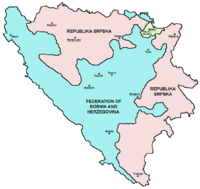Government and politics

The third level of Bosnia and Herzegovina's political subdivision is manifested in cantons. They are unique to the Federation of Bosnia and Herzegovina entity, which consists of ten of them. All of them have their own cantonal government, which is under the law of the Federation as a whole. Some cantons are ethnically mixed and have special laws implemented to ensure the equality of all constituent people.
The fourth level of political division in Bosnia and Herzegovina is the municipalities. The Federation of Bosnia and Herzegovina is divided in 74 municipalities, and Republika Srpska in 63. Municipalities also have their own local government, and are typically based on the most significant city or place in their territory. As such, many municipalities have a long tradition and history with their present boundaries. Some others, however, were only created following the recent war after traditional municipalities were split by the Inter-Entity Boundary Line. Each canton in the Federation of Bosnia and Herzegovina consists of several municipalities, which are divided into local communities.
Besides entities, cantons, and municipalities, Bosnia and Herzegovina also has four "official" cities. These are: Banja Luka, Mostar, Sarajevo, and East Sarajevo. The territory and government of the cities of Banja Luka and Mostar corresponds to the municipalities of the same name, while the cities of Sarajevo and East Sarajevo officially consist of several municipalities. Cities have their own city government whose power is in between that of the municipalities and cantons (or the entity, in the case of Republika Srpska).
As a result of the Dayton Accords, the civilian peace implementation is supervised by the High Representative for Bosnia and Herzegovina selected by the Peace Implementation Council. The High Representative has many governmental and legislative powers, including the dismissal of elected and non-elected officials. More recently, several central institutions have been established (such as defense ministry, security ministry, state court, indirect taxation service and so on) in the process of transferring part of the jurisdiction from the entities to the state.
The representation of the government of Bosnia and Herzegovina is by elites who represent the country's three major groups, with each having a guaranteed share of power.
The Chair of the Presidency of Bosnia and Herzegovina rotates among three members (Bosniak, Serb, Croat), each elected as the Chair for an eight-month term within their four-year term as a member. The three members of the Presidency are elected directly by the people with Federation voters voting for the Bosniak and the Croat, and the Republika Srpska voters for the Serb.
The Chair of the Council of Ministers is nominated by the Presidency and approved by the House of Representatives. He or she is then responsible for appointing a Foreign Minister, Minister of Foreign Trade, and others as appropriate.
The mayor of Doboj is Obren Petrović.
The Parliamentary Assembly is the lawmaking body in Bosnia and Herzegovina. It consists of two houses: the House of Peoples and the House of Representatives. The House of Peoples has 15 delegates chosen by parliaments of the entities, two-thirds of which come from the Federation (5 Croat and 5 Bosniaks) and one-third from the Republika Srpska (5 Serbs). The House of Representatives is composed of 42 Members elected by the people under a form of proportional representation(PR), two-thirds elected from the Federation and one-third elected from the Republika Srpska.
The Constitutional Court of Bosnia and Herzegovina is the supreme, final arbiter of legal matters. It is composed of nine members: four members are selected by the House of Representatives of the Federation, two by the Assembly of the Republika Srpska, and three by the President of the European Court of Human Rights after consultation with the Presidency, but cannot be Bosnian citizens.
However, the highest political authority in the country is the High Representative in Bosnia and Herzegovina, the chief executive officer for the international civilian presence in the country. Since 1995, the High Representative has been able to bypass the elected parliamentary assembly, and since 1997 has been able to remove elected officials. The methods selected by the High Representative have been criticized as undemocratic. International supervision is to end when the country is deemed politically and democratically stable and self-sustaining.

